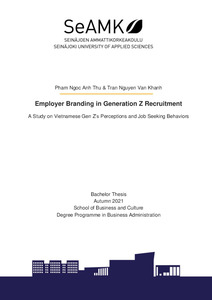Employer Branding in Generation Z Recruitment : a study on Vietnamese Gen Z’s perceptions and job seeking behaviors
Pham, Ngoc Anh Thu; Tran, Nguyen Van Khanh (2021)
Pham, Ngoc Anh Thu
Tran, Nguyen Van Khanh
2021
All rights reserved. This publication is copyrighted. You may download, display and print it for Your own personal use. Commercial use is prohibited.
Julkaisun pysyvä osoite on
https://urn.fi/URN:NBN:fi:amk-2021122290401
https://urn.fi/URN:NBN:fi:amk-2021122290401
Tiivistelmä
This thesis aims to study the perceptions regarding Employer Brand and job seeking behaviors under the influence of Employer Branding practices of the Vietnamese Generation Z. Henceforth, provide companies with key insights and suggestions of how to increase their attractiveness and competitiveness in young talents’ perception as well as keep these talents engaged in the recruitment process and eventually get them onboard.
The key theoretical foundations of this thesis are based on the theories of Employer Brand Equity, Employer Brand Knowledge framework, the Instrumental Symbolic framework, literature on recruitment, as well as concepts related to generation gap and Gen Z people’s characteristics. These theories are synthesized into an integrated conceptual framework to better demonstrate the relationship between Employer Brand, job seekers’ characteristics, and recruitment outcomes.
The assumptions made based on theoretical reviews are addressed with a cross-functional online survey targeting Vietnamese Gen Z. The survey participants were asked to respond to a questionnaire consisting of several multiple choice and scale rating questions, which collected information on people’s demographic background, perception toward a set of Employer Brand image factors, and general job seeking behaviors. The questionnaire gathered 125 responses from university students and young employees, who are seeking or may seek for a job in the near future. The analysis from data collected has confirmed the significance of Employer Brand in the job seeking and selecting decisions of Vietnamese Gen Z, narrowed down the most significant instrumental and symbolic factors in their perceptions, and recorded a pattern of job seeking behaviors that may provide useful insights to employers.
Thereby, relevant practical suggestions for companies, as well as theoretical implications were given upon the thesis’ empirical results. Certain limitations and not covered possibilities were also acknowledged to provide recommendations for future research.
The key theoretical foundations of this thesis are based on the theories of Employer Brand Equity, Employer Brand Knowledge framework, the Instrumental Symbolic framework, literature on recruitment, as well as concepts related to generation gap and Gen Z people’s characteristics. These theories are synthesized into an integrated conceptual framework to better demonstrate the relationship between Employer Brand, job seekers’ characteristics, and recruitment outcomes.
The assumptions made based on theoretical reviews are addressed with a cross-functional online survey targeting Vietnamese Gen Z. The survey participants were asked to respond to a questionnaire consisting of several multiple choice and scale rating questions, which collected information on people’s demographic background, perception toward a set of Employer Brand image factors, and general job seeking behaviors. The questionnaire gathered 125 responses from university students and young employees, who are seeking or may seek for a job in the near future. The analysis from data collected has confirmed the significance of Employer Brand in the job seeking and selecting decisions of Vietnamese Gen Z, narrowed down the most significant instrumental and symbolic factors in their perceptions, and recorded a pattern of job seeking behaviors that may provide useful insights to employers.
Thereby, relevant practical suggestions for companies, as well as theoretical implications were given upon the thesis’ empirical results. Certain limitations and not covered possibilities were also acknowledged to provide recommendations for future research.
